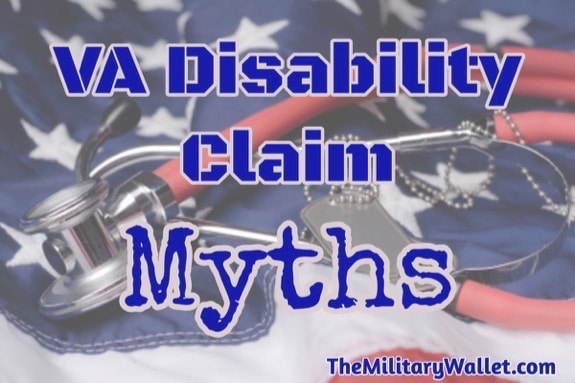Podcast: Play in new window | Download
Subscribe: Apple Podcasts | Google Podcasts | RSS
Many veterans don’t want to file a VA disability claim when they leave the military. There are many misconceptions about filing for VA disability compensation, what happens when the VA reviews your claim, and how it will affect veterans going forward.
In this article, we will discuss some myths surrounding VA benefits claims and why it’s a good idea to file a VA disability claim when you leave the military.
Table of Contents
- VA Disability Claim Myths
- Myth: I don’t have a disability.
- Myth: Having a VA disability rating will affect my future employment options.
- Myth: I won’t be able to join the Guard or Reserves with a VA disability rating.
- Myth: Getting VA Disability benefits will take them from someone who deserves them.
- Myth: I’m already receiving military retirement pay. VA Disability compensation will only reduce my retirement pay.
- Myth: VA Disability Compensation benefits aren’t worth that much.
- Myth: I’m not eligible for VA disability benefits.
- Myth: My illness / injury isn’t bad. There is no need to file a disability claim.
- Myth: It’s too late to file a disability claim—I left active duty years ago!
- Myth: If I’m awarded a VA disability rating, I will have to use the VA medical system for health care.
- Myth: The VA is so backed up, they will never process my claim anyway.
- Myth: I’m not eligible for VA Disability Compensation because I’m already receiving Social Security Disability Insurance (SSDI) (or disability through another program).
- Myth: My VA Disability rating is permanent.
- Myth: The increased amount of disability compensation awarded for having dependents legally belongs to them.
- Summary – Always Verify with the VA or a Veterans Benefits Counselor
VA Disability Claim Myths
Here are some common reasons veterans don’t want to make a VA disability claim:
Myth: I don’t have a disability.
This is probably the most common reason veterans don’t file a disability claim. Unfortunately, there is a stigma around the term “disability.”
A better way to look at a VA disability claim is to say, “I have a medical condition that occurred during, or was caused by, my military service.”
Likewise, you can think about “disability compensation” as an insurance policy against those same medical conditions. An approved disability claim will give you access to VA medical care and a monthly disability compensation payment (for ratings 10% or higher).
Filing a VA disability claim isn’t milking the system – it is a way to insure your future self from potentially worse medical conditions, get the medical treatment you need, and receive monetary compensation from lost earnings potential.
Myth: Having a VA disability rating will affect my future employment options.
Many jobs require members to be in top physical condition (police, firefighters, first responders, federal agents, etc.). Some of these careers may even require the member to pass a physical fitness test or other medical screening. In almost all of these cases, the underlying medical condition and your health and fitness will determine your ability to qualify for the job.
The fact you have a VA disability rating generally won’t impact your ability to land the job. To counter this myth, a VA disability rating may actually give you additional Veterans Preference Points for federal employment (some states may have a similar program for state job applications).
Myth: I won’t be able to join the Guard or Reserves with a VA disability rating.
This may or may not be true. It is possible to join the Guard or Reserves if you have a VA disability rating, provided you are otherwise healthy enough to serve.
In many cases, it’s possible to transfer directly from active duty to the Guard or Reserves without undergoing additional medical screening.
If you have a break in service, you may need to go through MEPS again, and possibly even request a medical waiver to join. But just having a disability rating doesn’t always prevent you from serving again. Again, the underlying medical condition will determine your ability to serve, whether there is a VA disability rating or not.
Myth: Getting VA Disability benefits will take them from someone who deserves them.
This is a noble line of thinking, but it’s not true. There is no quota or maximum number of veterans who can receive VA disability benefits. The VA also places veterans into Priority Groups based on the severity of their disability ratings, economic need, and other factors.
The VA is there for all veterans, not just those with the “greatest” need. You owe it to yourself and your family to receive the care and benefits you have earned.
Myth: I’m already receiving military retirement pay. VA Disability compensation will only reduce my retirement pay.
This is another statement based on a partial truth, then slightly twisted. Retirees with a VA disability rating of 40% or lower will have their military retirement pay reduced by the amount of disability compensation they receive from the VA. However, VA disability compensation is tax-free. So the net gain works in the veteran’s favor.
Retirees with a VA disability rating of 50% or higher are eligible to receive Concurrent Retirement and Disability Payments (CRDP). CRDP awards veterans their full military retirement pay along with their full disability compensation payment.
Military retirees with a disability rating may affect their pay in other ways. The following article will give you more information regarding how VA disability compensation affects military retirement pay.
Myth: VA Disability Compensation benefits aren’t worth that much.
I wouldn’t say that. A 10% disability rating brings in $133.17 per month in disability compensation (FY16 rates). That may not seem like a huge amount on the surface. But this monthly payment is also indexed to inflation, meaning it can increase over time.
The higher your rating, the larger the monthly compensation payment. Veterans with a disability rating of 30% or greater can add dependents to their disability claim. This will increase the monthly payment for each qualified dependent. Finally, you may be able to file a new claim for an increased rating if your condition worsens.
It’s not just about the money. Having a disability rating may open the door to additional military or veterans benefits. These can often be more valuable than the monthly compensation that comes with a disability rating. For example, having a VA disability rating makes veterans eligible to avoid the VA Loan funding fee, which is a percentage of the loan amount, often amounting to several thousand dollars.
See the VA Disability Compensation Rates Table for More Information.
Myth: I’m not eligible for VA disability benefits.
There are several reasons why some veterans don’t believe they are eligible for disability benefits. Some common misconceptions include their discharge rating, length of service, not having served during a war, not being wounded in battle, or other concerns. We can address each of these topics:
- Discharge Status: Veterans benefits are generally open to veterans with a discharge rating under other-than-dishonorable conditions (in other words, everything except a dishonorable discharge). This means veterans may still be eligible for disability benefits even if they have a Bad Conduct Discharge (BCD) or an Other Than Honorable (OTH) discharge (learn more about discharge upgrades).
- Length of Service: Active duty veterans generally need active duty service beyond basic training to be eligible for disability benefits unless the illness or injury occurred during basic training. This generally covers most veterans who served on active duty. Members of the Guard or Reserves who were only activated for training purposes should contact the VA for a records review to determine eligibility.
- Period of Service: Veterans may be eligible for disability benefits regardless of their served period. Disability benefits are not limited to those who served in battle or during a time of war. (note: Some other VA benefits programs, such as the Veterans Pension Benefit, may require wartime service. Disability benefits do not.).
- I wasn’t wounded in battle: As noted above, no service during war is required to be eligible for disability compensation benefits.
Myth: My illness / injury isn’t bad. There is no need to file a disability claim.
Everything is fine—until it isn’t. Injuries and illnesses can get worse as we age. This is likely to be the healthiest period of your life. File a disability claim if you have an illness or injury that occurred while in the military. Even if the condition is minor, establishing a service connection is the first step in having your disability claim approved. The sooner you make your claim, the easier it is to establish a connection to your military service.
Note about 0% disability ratings:
It is possible to receive a 0% disability rating. This occurs when the VA acknowledges an illness or injury connected to your military service. This is still considered a valid disability rating; you can file a new claim requesting the rating increase if the condition worsens.
Myth: It’s too late to file a disability claim—I left active duty years ago!
There is no timeline to file a disability claim for a service-connected disability. However, it’s generally much easier to file a claim shortly after leaving the military. This is because you need to establish a connection to your illness or injury and your military service. This is generally easier when done shortly after leaving the military.
However, some illnesses and injuries don’t occur until years after leaving military service. This has received national attention recently as many veterans from the Korean and Vietnam War eras have been diagnosed with cancers and other medical conditions associated with Agent Orange exposure or related chemicals or exposure to contaminated water at Camp Lejeune.
Other exposure hazards include mustard gas, asbestos, ionizing radiation, Project 112/SHAD (chemical tests to defend against biological and chemical weapons threats), and Radiogenic Risk Activities. You can learn more about these chemical exposures.
In these cases, symptoms can take years or even decades to appear.
Remember, there is no time limit to file a claim! Here is an article from a veteran who filed VA disability claims several years after separating from active duty.
Myth: If I’m awarded a VA disability rating, I will have to use the VA medical system for health care.
The VA doesn’t require veterans to enroll in the VA health care system if they are eligible for health care. You also aren’t required to use the VA medical system if you do enroll. Many veterans choose to continue using their current healthcare plan. But it’s nice to know the benefit if there for you if you ever need it.
Myth: The VA is so backed up, they will never process my claim anyway.
VA disability claims can indeed take a long time to be processed. But that doesn’t mean you shouldn’t make a claim. Your claim will be processed more quickly if you double-check your claim for completion and accuracy before submitting it for review.
It’s also a good idea to seek the assistance of a veterans benefits counselor before filing your claim. Many organizations offer free benefits claims, counseling, and assistance. Take advantage of their expertise before filing – it will save you a lot of time and stress!
Myth: I’m not eligible for VA Disability Compensation because I’m already receiving Social Security Disability Insurance (SSDI) (or disability through another program).
You should verify this information before assuming you are ineligible to receive both forms of compensation. For example, it is possible to receive both VA disability compensation and Social Security Disability Benefits. There is even a program called Social Security Disability Benefits for Wounded Warriors. No rule states you cannot receive compensation from both sources. In fact, having a 100% Permanent and Total VA rating can make you eligible for expedited processing for your Social Security Disability claim.
Myth: My VA Disability rating is permanent.
This is a partial truth. Some disability ratings are permanent, while others are given a temporary rating. In some cases, the VA will send veterans a Notice of Reexamination Letter, which informs the veteran of their intent to reexamine the veteran to determine whether or not the veteran’s medical condition is the same. The reexamination can result in no change, an increased or decreased rating.
There are also several rules surrounding which disability ratings can be subjected to a reexamination and times when the VA cannot reexamine your disability (including how long you have held the rating, your age, and other factors).
I recommend reading this guide on reduced VA disability benefits for more information.
Myth: The increased amount of disability compensation awarded for having dependents legally belongs to them.
This is false. The disability compensation is awarded to the veteran, not the family member(s). It is intended for the veteran to use the additional money to support the family members, but it is not awarded directly to the family members. The increased compensation does not legally belong to the children, it legally belongs to the veteran.
That said, the family members must continue to be legal dependents for the veteran to continue receiving the increased disability compensation. In the case of a divorce or separation, the veteran must continue to support the dependents to continue being able to legally claim them as dependents on their VA disability claim. Any change of dependency status should be reported to the VA.
Summary – Always Verify with the VA or a Veterans Benefits Counselor
VA disability claims can be very complicated. But veterans have access to benefits counselors who will offer free claims assistance. Find a Veterans Service Organization (VSO) you trust and work with them on your claim. Your representative can help dispel any of the above myths, clear up any misconceptions, and answer your questions. they also have hands-on experience with the claims process. They can help you avoid problems that might add months or years to your claim.




Comments:
About the comments on this site:
These responses are not provided or commissioned by the bank advertiser. Responses have not been reviewed, approved or otherwise endorsed by the bank advertiser. It is not the bank advertiser’s responsibility to ensure all posts and/or questions are answered.
Doug Bultje says
I had surgery at the VA, they messed up my ureatha by putting on the catheter wrong. Also right after the surgery my right leg was very cold feeling in the hospital. Saw a neurologist in the VA and he said all the feeling would comeback. Bull. Only some has comeback and it it sill gets cold. The surgery cut also still hurts which my spouse rubs in twice a day with bengay or icy hot. The tort act has expired, can I still file a claim against the VA?